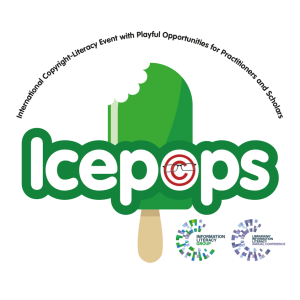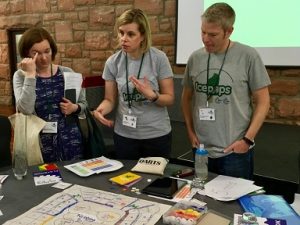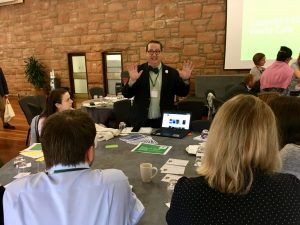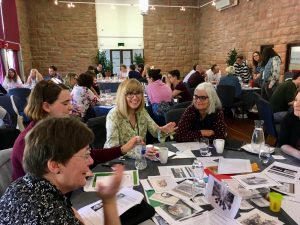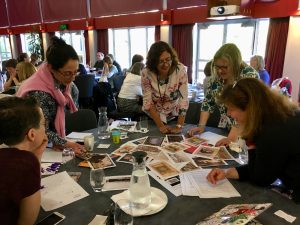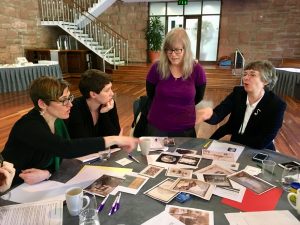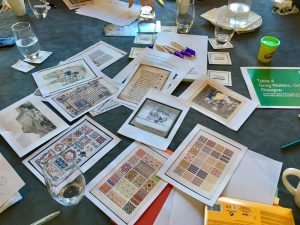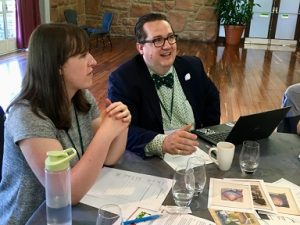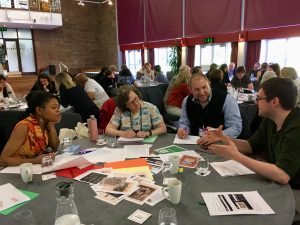Lorna M. Campbell, Senior Service Manager – Learning Technology within Education Design and Engagement – at the University of Edinburgh, blogs about her experience at the International Copyright-Literacy Event with Playful Opportunities for Practitioners and Scholars (Icepops) 2019 in this post. This was originally posted on her blog, and is available under CC-BY 3.0.
Ok, confession time; I’m useless at playing games. Any kind of games – card games, board games, computer games, strategy games, discovery games, competitive games, for some reason they just don’t hold my attention. I’m not sure why that is, I just don’t seem to have that “hook” that engages people with game play. Although I’m not a natural game player, I do really enjoy playfulness and creativity (who doesn’t?!) and copyright literacy is definitely my thing so I really appreciated being able to go along to last week’s ICEPOPS Conference here at the University, not least because my inspirational OER Service colleague Stephanie (Charlie) Farley was giving her first ever keynote. Icepops is the International Copyright-Literacy Event with Playful Opportunities for Practitioners and Scholars, which is run by Jane Secker and Chris Morrison of the UK Copyright Literacy Team, in conjunction with the CILIP Information Literacy Group. The themes of the conference this year were copyright education, games and play, music and copyright, creativity and the relationship of copyright literacy to information literacy and scholarly communication.
Melissa Highton, Director of Learning Teaching and Web Services here at the University, opened the conference by welcoming delegates to the University and the city. Melissa emphasised the importance of copyright as part of the University’s core business and highlighted the role of the OER Service in supporting and developing copyright literacy across the institution.
Simon Anderson gave a really engaging and interactive keynote on copyright infringement in music “Stop me if you think you’ve heard this before”, and yes, he did play snippets of music live on stage and asked us to vote on whether they sounded similar or not. Simon introduced us to the fabulous Lost in Music resource developed by the University of Westminster, a free and open resource that aims to demystify and develop understanding of copyright and infringement within the music industry. The site includes a wide range of legal case studies and resources including the highly entertaining You Be The Judge, which challenges listeners to decide at what point a piece of music becomes infringing. Simon played this game with us at the conference and it was a lot of fun. I particularly enjoyed the lightbulb moment when he added one tiny sequence of notes to the piece of music and suddenly everyone in the room recognised it! I also learned that the Australian band Men At Work were successfully sued in 2010 because their 1983 hit Down Under ripped off the Kookaburra song. Who knew? There was also an interesting question about who is responsible for potential copyright infringement in machine generated music. The answer isn’t yet clear.
Following Simon’s keynote, the rest of the morning was taken up by a whirl wind of amazingly creative copyright education world café sessions and pecha kucha presentations including one fascinating talk on the copyright and performance rights of John Cage’s 4’33”.
Icepops World Cafe (CC BY, Lorna M. Campbell)
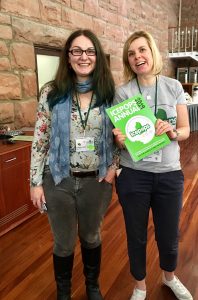
I also got to take part in my very first escape room challenge run by Katrine Sundsbø of the University of Essex. The Open Access Escape Room challenged us to thwart a villain who had hidden away all publications by unlocking the research to make everything free. It was a lot of fun and Charlie and I came away with lots of ideas about how we could adapt the format for an open education escape room for next year’s Festival of Creative Learning.
The afternoon opened with Charlie’s keynote “Make and release – embedding practice through play”. Charlie spoke eloquently about the significance of play and creativity in her own life and working practice. In terms of introducing playful engagement in the workplace, Charlie highlighted the importance of the “lusory attitude”, the mindset we enter into that let us accept the arbitrary rules of a playful space in order to engage with play and creativity. Charlie said that she found “that by creating a lusory attitude or environment, staff and students are more willing to experiment and learn new technologies and skills with much less fear and apprehension”. To let us do just that, Charlie led us through a short Board Game Jam session. It’s always great to see the creativity that results when people engaging with the University’s open licensed image collections through Board Game Jam, and this time was no exception. As might be expected, the Icepops delegates created some amazing and highly entertaining game scenarios.
Icepops Board Game Jam (CC BY, Lorna M. Campbell)
During her keynote, Charlie also challenged us to draw or write a short story about our journey to becoming a copyright literacy expert. This is mine 🙂
My copyright literacy story….
A long time, in a galaxy far, far away, an HE funding council launched an OER programme. All the outputs of the programme were to be completely free and open licensed! #icepops2019
— Lorna M. Campbell (@LornaMCampbell) June 26, 2019
And that, ladies and gentlemen, was the start of my journey to becoming a copyright, open licensing and #OER expert 🙂 https://t.co/tMJMfzIoJk #UKOER #4Life #icepops2019
— Lorna M. Campbell (@LornaMCampbell) June 26, 2019
Chris and Jane brought the conference to a poignant close with a tribute to Marion Kelt, a long standing member of the UK copyright literacy community, who had been due to attend the conference. Marion’s touching and funny Copyright Comic, a lovely memorial to her, features in the Icepops Annual 2019.
Sadly, I wasn’t able to stay in Edinburgh for the after-conference entertainment, though it sounds like the playful and musical theme of the event continued well into the evening with the Icepops houseband The Infringers XD
It was great to experience the playfulness and creativity of the copyright literacy community at Icepops and I came away with some really cool ideas that we can incorporate into our OER Service digital skills programme. But perhaps the most important thing I learned at Icepops is that maybe I’m not as bad at playing games as I thought!

